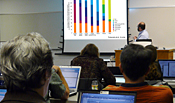Dear colleagues and friends:
I will retire on July 1, 2020, after an academic career spanning more than three decades at OHSU. I am thankful for my interactions with all of you, through good and hard times. And I am proud of what we accomplished together, in many collaborative projects and initiatives—many of them rooted on the Columbia River.
Directing the Center for Coastal Margin Observation & Prediction was, in particular, a transformative experience. I want to emphasize that CMOP would not have been possible without the contributions of many of you—whether or not you were formally a member.
The CMOP observatory was envisioned as a ‘forever resource’ for the region. That vision transcends individuals, projects and funding sources. Instead, it requires an institutional home with a transgenerational culture, history and capability.
I am deeply honored that the Columbia River tribes have assumed the stewardship of the CMOP observatory: https://www.critfc.org/blog/press/columbia-river-tribes-assume-stewardship-of-renowned-ocean-estuary-research-institution/. The Columbia River Inter-Tribal Fish Commission will be the steward of record. Assuming this stewardship fits and enables the emerging desire of the tribes to expand their role in the estuary and ocean, as a part of an holistic view of salmon and natural resources.
This transition was carefully considered by the tribes, upon my invitation, over the past two years. The formal Memorandum of Understanding was executed by OHSU and CRITFC on May 29, effective on June 1. CMOP staff with directly relevant expertise will contribute, now at CRITFC, to the success of the transition. CRITFC will assume the role CMOP has played in the Northwest Association of Networked Ocean Observing Systems (NANOOS), the Pacific Northwest regional association of the US Integrated Ocean Observing System (IOOS).
By design, CMOP was never ‘standard’ in its approach to science, education, broadening participation and outreach. We believed in new, better paradigms, and took the risks associated with exploring them.
True to form, I hope that, in this transition, the CMOP legacy will be precedent-setting by embracing the power of natural inclusivity to advance science for the benefit of all.
Warm regards,
-- Antonio Baptista
Member Login
News Highlights

CMOP in the News
Interview with Dr. Joseph Needoba on teaching oceanography in Antarctica
Students on Ice

Podcast
Our Global Estuary
NPR reports on international workshop
WQCS

Webcast
Development of Novel Impedimetric Assays for Rapid Detection of E. coli
Vena Haynes, Thesis Defense



